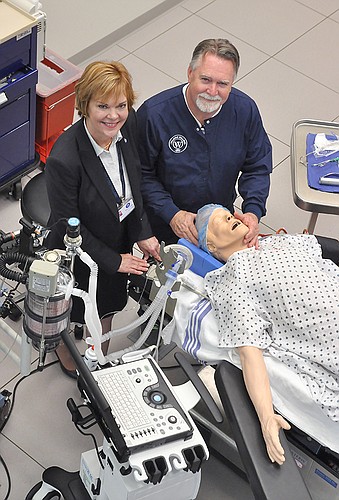- November 24, 2024
-
-
Loading

Loading

Wolford College in Naples seeks a key regional certification that will set the stage for adding academic offerings beyond master and doctorate degrees in anesthesia.
“It's a huge, big deal,” says Lynda Waterhouse, a Wolford veteran promoted to president and CEO this spring after a couple of years as CFO.
Not that the college wasn't doing well with a niche in anesthesia education. It has about 150 students. Many grads find salaries in the six-figure range.
But regional accreditation can open the door for program expansions, and it's also a requirement to keep the national accreditation the 16-year-old college has from the Council on Accreditation of Nurse Anesthesia Education Programs. “We hope to achieve it in the next two to three years,” Waterhouse says.
Success would assure growth and possibly easier access to capital at the college founded by the principals of Collier Anesthesia PA. The practice group saw the college as a way to provide trained professionals for its office and others like it.
In a move designed to allow easier access to capital, Wolford switched to a for-profit operation in 2010. The college, named after well-known nurse anesthetist Norman R. Wolford, posted revenue of $4.7 million in 2015 and $4.6 million in 2014.
“At this point we are contemplating expanding our programs to include similar compatible types of programs,” says Waterhouse of Wolford, which this year had 150 students for terms that began in February and June.
But she emphasizes that a mountain of work is ahead for gaining a seal of approval from The Southern Association of Colleges and Schools Commission on Colleges, a body responsible for the accreditation of degree-granting higher education institutions in Florida and 10 other Southern states.
“The requirements are different than what the national accrediting body wants,” Waterhouse notes.
For instance, the national body looks more at such “organic elements” as education and curriculum, she says. “The regional body looks at institutional effectiveness. They want to know you have a strategic plan and that student outcomes are linked to that strategy.”
Doing that will fall to Waterhouse and her staff. “The regional accreditation body wants you to have a year of data on things like student outcomes,” she says.
Wolford students get 12 months of classroom instruction followed by 16 months of clinical training. Its doctorate program is entirely online and requires students to have received a master's degree in nurse anesthesia, Waterhouse says.
Instruction received significant enhancement in June with the delivery of a pair of “high-fidelity” mannequins at a cost of about $75,000 each. “They have really ramped up our simulation labs,” Waterhouse says. “You can put them into some of the same crisis modes” encountered in operating rooms.
Waterhouse watched a recent intubation instruction in which the students inserted a plastic tube into a mannequin's windpipe. “Each mannequin had a slightly different airway,” she says. “It was remarkable to see at first how nervous and hesitant they were and, toward the end, how” confident they were.
“We can re-create what they would be doing in the operating room,” she says.